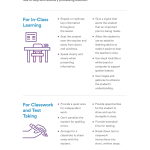Auditory Processing Disorder Accommodations: Breaking Down Barriers

Are you or someone you know struggling to make sense of sound? You’re not alone, fam. Auditory Processing Disorder (APD) affects millions of people worldwide, making everyday conversations, school, and work a real challenge. In this article, we’ll dive into the world of auditory processing disorder accommodations, exploring what they are, why they’re essential, and how to make them work for you.
What’s Auditory Processing Disorder, Anyway?
Before we jump into auditory processing disorder accommodations, let’s get the basics down. APD is a neurological condition that affects how our brains process sound. It’s not a hearing problem (although it can co-occur with hearing impairments) or a result of being lazy or distracted. APD can cause problems with:
- Sound localization: figuring out where sounds are coming from
- Sound filtering: blocking out background noise
- Sound memory: remembering what was just said
- Sound-speech integration: connecting sounds to words and meanings
The Impact of APD on Daily Life
Living with APD can be frustrating, to say the least. Imagine being in a crowded restaurant, trying to have a conversation with friends, but struggling to make out what anyone is saying. Or being in a meeting at work, trying to take notes, but getting lost in the sounds around you. Auditory processing disorder accommodations can be a game-changer in these situations.
What Are Auditory Processing Disorder Accommodations?
So, what exactly are these magical solutions? Auditory processing disorder accommodations are strategies, tools, and adjustments that can help individuals with APD better process and navigate the world of sound. These can include:
- Assistive listening devices (ALDs) like FM systems or personal amplifiers
- Speech-to-text software for written communication
- Modified seating or positioning to reduce distractions
- Noise-cancelling headphones or earplugs to block out background noise
- Breaks or time-outs to give the brain a chance to rest
Accommodation Ideas for School and Work
If you’re a student or employee with APD, don’t worry – there are tons of auditory processing disorder accommodations that can help you succeed. Here are some ideas:
- Preferential seating: Sitting in a quiet area, close to the teacher or speaker, can make a big difference.
- Note-taking assistance: Using a note-taker or recording device can help you stay on top of assignments and lectures.
- Communication strategies: Using visual aids like diagrams or charts can help you better understand complex information.
- Audio materials: Providing audio materials, like audiobooks or podcasts, can help you access information in a more comfortable format.
Accommodation Ideas for Social Situations
Social situations can be tough with APD, but there are ways to make them more enjoyable. Here are some auditory processing disorder accommodations to try:
- Choosing quiet spaces: Opting for quieter restaurants, cafes, or meeting spots can help reduce distractions.
- Using visual aids: Using visual aids like transcripts or subtitles can help you follow conversations.
- Breaking it down: Breaking down conversations into smaller, more manageable chunks can help you stay on track.
- Taking breaks: Taking regular breaks to give your brain a rest can help reduce fatigue.
Assistive Technology for APD: A Deep Dive
Assistive technology (AT) is a big part of auditory processing disorder accommodations. From simple devices like earplugs to more complex software like speech-to-text apps, there are tons of options out there. Here are some examples:
- FM systems: These are systems that use radio waves to transmit sound from a speaker’s microphone to a listener’s receiver. They can be super helpful in noisy environments.
- Personal amplifiers: These are small devices that amplify sound, often used in one-on-one conversations.
- Speech-to-text software: This software can transcribe spoken language into written text, often used for lectures, meetings, or presentations.
Creating a Support Network
Living with APD can be isolating, but it doesn’t have to be. Building a support network of friends, family, and professionals can make a huge difference. Here are some ideas for creating a support network:
- Talking to friends and family: Educating loved ones about APD can help them better understand and support you.
- Joining a support group: Connecting with others who have APD can be a great way to share experiences and advice.
- Seeking professional help: Working with an audiologist, speech-language pathologist, or other specialist can help you develop strategies and find resources.
Closing: Empowering Yourself with Auditory Processing Disorder Accommodations
Living with APD doesn’t have to be a limitation. By embracing auditory processing disorder accommodations, you can break down barriers and achieve your goals. Remember, it’s all about finding what works for you and using it to empower yourself. Don’t be afraid to experiment, ask for help, and advocate for yourself. With the right support and strategies, you can thrive in a world of sound.
<